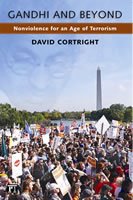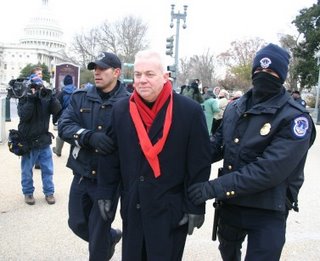 Nonviolence and The Strategy Against Terrorism
Nonviolence and The Strategy Against Terrorismby David Cortright
In the months after 9/11, Jim Wallis challenged peace advocates to address the threat of terrorism. “If nonviolence is to have any credibility,” he wrote, “it must answer the questions violence purports to answer, but in a better way.” Gandhian principles of nonviolence provide a solid foundation for crafting an effective strategy against terrorism.
Nonviolence is fundamentally a means of achieving justice and combating oppression. Gandhi demonstrated its effectiveness in resisting racial injustice in South Africa and winning independence for India. People-power movements have since spread throughout the world, helping to bring down communism in Eastern Europe and advancing democracy in Serbia, Ukraine, and beyond. The same principles - fighting injustice while avoiding harm - can be applied in the struggle against violent extremism.
Bush administration officials and many political leaders in Washington view terrorism primarily through the prism of war. Kill enough militants, they believe, and the threat will go away. The opposite approach is more effective and less costly in lives. Some limited use of force to apprehend militants and destroy training camps is legitimate, but
unilateral war is not. In the three years since the invasion of Iraq, the number of major terrorist incidents in the world has increased sharply.
War itself is a form of terrorism.
Using military force to counter terrorism is like pouring gasoline on a fire. It ignites hatred and vengeance and creates a cycle of violence that can spin out of control. A better strategy is to take away the fuel that sustains the fire. Only nonviolent methods can do that, by attempting to resolve the underlying political and social factors that give rise to armed violence.
The most urgent priority for countering terrorism, experts agree, is multilateral law enforcement to apprehend perpetrators and prevent future attacks. Cooperative law enforcement and intelligence sharing among governments have proven effective in reducing the operational capacity of terrorist networks. Governments are also cooperating to block financing for terrorist networks and deny safe haven, travel, and arms for terrorist militants. These efforts are fully compatible with the principles of nonviolence.
Terrorism is fundamentally a political phenomenon, concluded the U.N. Working Group on Terrorism in 2002. To overcome the scourge, “it is necessary to understand its political nature as well as its basic criminality and psychology.”
This means addressing legitimate political grievances that terrorist groups exploit - such as the Israel-Palestine dispute, repressive policies by Arab governments, and the continuing U.S. military occupation in Iraq. These deeply-held grievances generate widespread political frustration and bitterness in many Arab and Muslim countries, including among people who condemn terrorism and al Qaeda’s brutal methods. As these conditions fester and worsen, support rises for the groups that resist them. Finding solutions to these dilemmas can help to undercut support for jihadism. The strategy against terrorism requires undermining the social base of extremism by driving a wedge between militants and their potential sympathizers. The goal
should be to
separate militants from their support base by resolving the political injustices that terrorists exploit.
A nonviolent approach should not be confused with
appeasement or
a defeatist justification of terrorist crimes. The point is not to excuse criminal acts but to learn why they occur and use this knowledge to prevent future attacks. A nonviolent strategy seeks to reduce the appeal of militants’ extremist methods by
addressing legitimate grievances and providing channels of political engagement for those who sympathize with the declared political aims. A
two-step response is essential: determined law enforcement pressure against terrorist criminals, and active engagement with affected communities to resolve underlying injustices. Ethicist Michael Walzer wrote, counterterrorism
“must be aimed systematically at the terrorists themselves, never at the people for whom the terrorists claim to be acting.” Military attacks against potential sympathizers are counterproductive and tend to drive third parties toward militancy. Lawful police action is by its nature more discriminating and is more effective politically because it minimizes predictable backlash effects.
Gandhi’s political genius was in understanding the power of third party opinion. He did not try to challenge the British militarily but instead organized mass resistance to weaken the political legitimacy of the Raj. The nonviolent method, Reinhold Niebuhr wrote, undermines the authority and “moral unction” of the adversary. Gandhi realized that
political struggles are ultimately a battle for hearts and minds. In all his campaigns, he assiduously cultivated the support of third parties by avoiding harm to the innocent and addressing legitimate grievances. These are essential insights for the struggle against terrorism.
The fight will not be won on the battlefield. The more it is waged on that front, the less likely it can be won. The goal of U.S. strategy, said the 9/11 Commission, must be “prevailing over the ideology that contributes to Islamic terrorism.” Nonviolent resistance is the opposite of and a necessary antidote to the ideology of extreme violence. Gandhi often said,
“An eye for an eye leaves the whole world blind.” Better to keep our eyes open as we search for more effective means of eroding support for extremism, while protecting the innocent and bringing violent perpetrators to justice.
David Cortright is the author of Gandhi and Beyond: Nonviolence for an Age of Terrorism (Paradigm Publishers, 2006) and co-founder of the Center on Global Counter-Terrorism Cooperation.






















